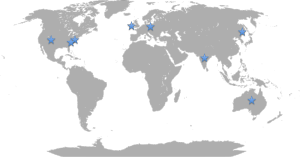 This morning as I was trying to identify a topic for this week’s blog post, I came across this post from The.Project.Management.Hub on what superpower you wish you had as a project manager. This reminded me of the icebreaker activity at last night’s STEM for Her Volunteer Appreciation event.
This morning as I was trying to identify a topic for this week’s blog post, I came across this post from The.Project.Management.Hub on what superpower you wish you had as a project manager. This reminded me of the icebreaker activity at last night’s STEM for Her Volunteer Appreciation event.
I recently read Strategic Connections and was very interested in the mechanics of how people introduce themselves during networking. While I hadn’t really thought about it beforehand, I was definitely able to relate to the problem of having a conversation shut down once names, titles & companies were exchanged. While I was planning the volunteer appreciation event, I really wanted to make everyone feel welcome and make networking easy. Instead of the attendees getting bogged down in the details of companies and titles, I created an ice breaker focused on each person’s super power. Since these were all women affiliated with advancing the #stemforher mission, I thought there might be some pretty interesting responses. I was not disappointed.
Today, I’m going to share some of these super powers with the hope of inspiring you to think about yours.
Connection
This super power allows you to quickly assess the needs of people and bridge the gap to other people who can help. The connectors among us establish lasting relationships and generously share of their network.
Leap tall buildings in a single bound
This super power allows you to overcome large obstacles and deliver amazing results. This power allows you see beyond the problem obstructing your path and allows you to create the plan to circumvent it.
Seeing the future
The ability to see the future puts you ahead of the game. You can anticipate the direction and adjust your plan to fulfill your goals.
Shapeshifting/transformation
This super power allows you to be malleable to any situation. This power makes it easy to adapt to the temperament, setting and character of any situation. It allows you to rise above the fray to be successful and deliver your desired outcome.
Time travel
This super power combines the ability to see the future with anticipating issues before they arise. Time travelers can adjust quickly to prevent small issues from escalating.
I hope you were inspired to think about your super power – that unique thing that you do really well and allows you to excel at whatever you do. I also hope you’ll consider sharing it with me the next time we meet. Instead of saying “Hi, I’m Dagny Evans, Managing Director at Digital Ambit”, let’s initiate our conversation with “Hi, I’m Dagny Evans, I use my time travel super power to successfully deliver complex data projects.” It sounds a lot more interesting!
